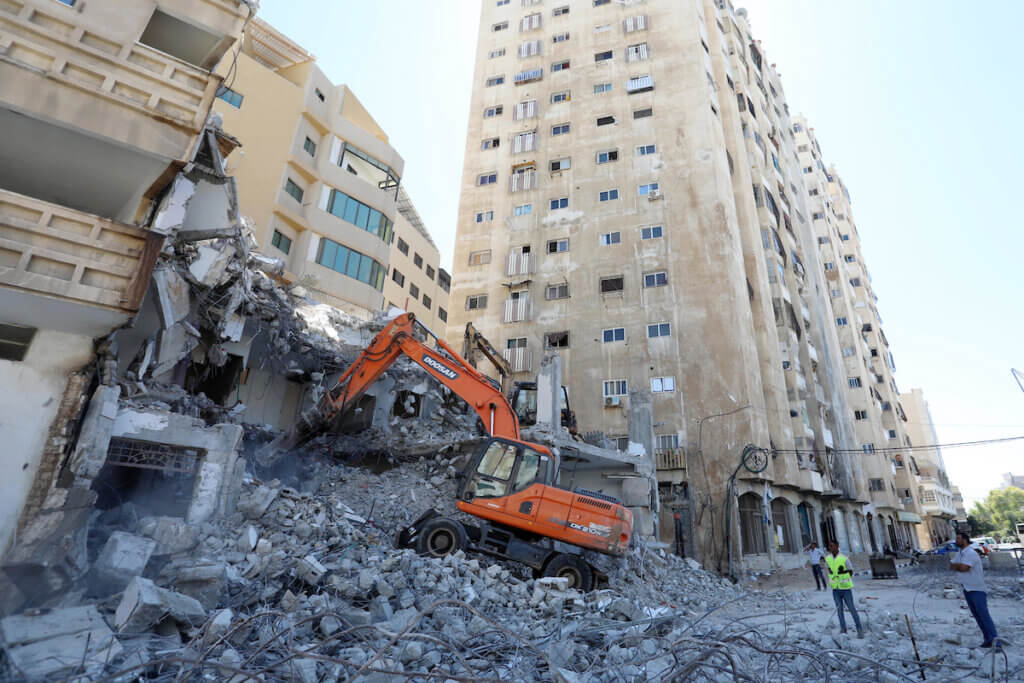Over the last decade Mahmoud Abu Shkyan has been a carpenter, a grocer, and a stylist, but today the 28-year-old father of one with another kid on the way is unemployed. His barbershop was destroyed in an airstrike last May, one day before a ceasefire was declared between Hamas and Israel during the most intense escalation of hostilities in seven years.
The shop itself was a modest 160 square foot room that squeezed in three salon chairs and a big sofa. In early 2021, Abu Shkyan borrowed $5,000 from friends and family to start the business and was earning around $350 a month.
He now has no way to repay the debt.
Before he opened his business he worked at his father’s grocery store, a small shop that sold canned foods, drinks, snacks for children, and basics like cheese and yogurt. “I was the happiest young man to be able to help my father,” Abu Shkyan said.
The store closed permanently in the spring of 2020 when the pandemic caused many businesses across Gaza to shutter.
Since the blast destroyed his business, Abu Shkyan has taken to strolling by the Mediterranean Sea, puffing on cigarettes, walking miles before returning home to a house in the Jabalia refugee camp, a cramped urbanscape in the north of the Gaza Strip that was hit particularly hard in an escalation between Hamas Israel last May.
“Israel has been destroying the livelihood of my pregnant wife and my little kid Lana for many years to come,” he says.
The story of the young barber is one of the thousands of enterprises that shut down as a result of damage from Israeli airstrikes and artillery fire during hostilities.
Thirty-one-year-old Palestinian chef Saja Abu Shaaban also lost a business in an airstrike last May. She owned Baytuna Restaurant on the ground floor of the al-Jawhara Tower, a high-rise that was leveled in an airstrike on May 12, 2021.
Most of her clientele were busy professionals with offices in the building who would order out. She hired a team of women to run the place and specialized in traditional Palestinian cuisine like musakhan and stuffed cabbage with rice and minced meat.
“The idea of the women’s home-cooking project came in response to the Palestinian market’s lack of homestyle food. Restaurants are full of traditional Western and Eastern foods,” she said.
“I do not know what is the next step in our debt-ridden project,” she said.

According to Raed Al-Jazzar, Gaza’s General Director of Industry at the Ministry of National Economy, around 2,500 businesses have closed in Gaza since May, costing around $156 million in damages and losses. Within this figure, around 800 businesses were from the service industry, like Abu Shkyan and his barbershop.
Al-Jazzar headed up the team that assessed damage to the economy, which was a massive undertaking in coordination with the United Nations and consisted of 100 auditors and inspectors. The unit is developing a process for small business owners to recoup some of their losses.
“The compensation process depends on the amount of foreign aid and donations provided by the contributors,” he said.
What’s more, around 1,033 businesses in the industrial sector are still awaiting reconstruction disbursements from the previous major escalation with Israel in the summer of 2014. According to the head of the Federation of Industries Mohamed Al-Mansi, only 7% of the total value of the losses to industry from 2014 were recovered through direct payments to businesses.
Abu Shkyan was part of this group that was left empty-handed. At that time, he was a carpenter building beechwood furniture for Jarada Carpentry, a specialty woodworking factory in the eastern Gaza neighborhood of al-Zaytoun. The factory was damaged beyond repair by artillery fire, costing an estimated $150,000.
Though, at its height, the company employed 25 carpenters. Abu Shkyan calls this his “golden era.”
“I thought of nothing but honing my skills and stabilizing my job. I had enough money. But again, Israel destroyed everything,” he said.
Sarah Algherbawi
Sarah Algherbawi is a freelancer writer and translator from Gaza.
Mondoweiss is a nonprofit news website dedicated to covering the full picture of the struggle for justice in Palestine. Funded almost entirely by our readers, our truth-telling journalism is an essential counterweight to the propaganda that passes for news in mainstream and legacy media.
Our news and analysis is available to everyone – which is why we need your support. Please contribute so that we can continue to raise the voices of those who advocate for the rights of Palestinians to live in dignity and peace.
Support Mondoweiss from as little as $1. Thank you.
Related posts:
Views: 0
 RSS Feed
RSS Feed

















 October 26th, 2021
October 26th, 2021  Awake Goy
Awake Goy 
 Posted in
Posted in  Tags:
Tags: 
















